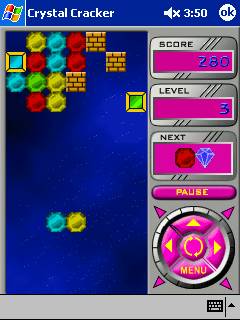|
|
Chris De Herrera's Windows CE Website |
|---|---|
About |
|
| By Chris De Herrera Copyright 1998-2007 All Rights Reserved A member of the Talksites Family of Websites Windows and
Windows CE are trademarks of
Microsoft All Trademarks are owned |
Crystal Cracker
Review
By Allen
Gall, Copyright 2002
Revised 4/3/2002
[an error occurred while processing this directive]
California-based software developer PDAutlities.com has released an impressive number of games in its relatively short history. Although the games are certainly not as polished or flashy as some of those put out by competitors, the sheer range of offerings and very reasonable pricing has made the company a worthy addition to the stable of Pocket PC developers.
The company�s newest offering, Crystal Cracker, is an interesting attempt to expand the genre of falling tile games starting with Tetris and Dr. Mario and leading to games like Super Puzzle Fighter and countless others. Most of the better games in the genre have tried to add new elements to game play; some of the Tetris clones on the Pocket PC have experimented with different block shapes and colors, while titles such as PocketSwap tried to combine the two genres.
Some gamers may scoff at such games such as these, but they�re popular. In fact, Bejeweled is one of the most popular games on the Palm platform, and lots of Pocket PC game developers are creating similar titles, even though the platform is capable of much more sophisticated games. While we�re likely to see more of this type of game, since these titles are fairly easy to make, require little processing power, and rely on simple, yet addictive formulas, future titles will likely focus more on strategy than mind-numbing repetition.
Crystal Cracker is one such title. In a sense, the game is Tetris in reverse; rows containing crystals rise from above, and you�ll need to match them to progress to the next level. But it�s not just a matter of matching similar-colored �crystals� to prevent the screen from becoming full. In each level, you�ll have one or more squares, and your goal is to place three crystals (which enter the board in rows of three) beneath a similar-colored square in order to remove the square. Sound easy? Not necessarily. The screen can fill up pretty quickly, and some of the crystals have special effects: one, for example, will destroy one crystal (this is called a �cracker�), while another will take the shape of whatever crystal it touches. To complicate things further, some rows contain �bricks� that cannot be removed except by crackers. The rising crystal rows don�t remain intact, either; rows will �break apart� if there�s nothing above the individual crystals.
Interacting
with the game is a mixed bag. Instead
of relying on the directional pad or buttons (which bring up their default
applications), the game uses a sort of virtual controller akin to the ones
used in older Windows CE games developed when many devices didn�t have
directional pads. Control is
intuitive; to rotate a row of crystals, simply tap the button in the
middle (you can only rotate a row clockwise).
To move the row left or right, simply tap on one of the outer
buttons. Tapping the upper
button will cause the row to move up quickly.
|
|
| Crystal Cracker has some interesting twists that make it one of the more challenging of the �falling block� games. |
The problem with this type of control method is that it doesn�t lend itself well to situations where split-second movement is required. Directional pads are important to gamers because they allow for a quick succession of movements with a minimal amount of effort. Having to move the stylus around and tap on buttons becomes awkward and frustrating in this type of game, especially when the action is intense. When playing Tetris, I would often make a critical move�say, rotating a piece counter-clockwise or placing it in just the right spot�just at the last moment. In this game, that type of control is crucial, since you�ll need to focus on the blocks and some of your crystals will be detrimental.
Contributing to this problem is the game�s speed�it�s a little too fast. Even at the first level, the rows fall in rapid succession, and if you�re not quick on the draw with your stylus, you�ll find the pieces piling up (or piling down, I should say) very quickly. Unfortunately, there�s no way to adjust the game�s speed or difficulty, so you�ll have to just be quick on your feet from the beginning. Another quirk I noticed is that tapping on any of the move buttons brings up the cut and paste animation native to Pocket PC 2002. Although this cosmetic issue didn�t affect game play, I found it a little distracting.
Despite these issues, the game is still fun and challenging. Since you can remove vertical rows by matching four crystals, you can either focus on removing the blocks to get to the next level or play it by ear and try for a higher score. The blocks themselves create some interesting challenges depending on where they are placed. Although the graphics aren�t cutting-edge, they have a nice beveled look. Sound effects are also fairly Spartan, but they provide auditory reinforcement of what�s happening on the screen and generally good enough to remind you that you�re playing a game. High scores are saved, so you can always challenge yourself (or friends) to get the high score.
Hardcore gamers will probably like the strategic twist offered by Crystal Cracker and find it a worthy addition to the �falling block� game genre. Casual gamers, on the other hand, may be frustrated by the controls and demanding game play; those who are just looking for something to play during a meeting or lunch break might opt for something a little more sedate.
Crystal Cracker is available for $7.99 and runs on all Pocket PCs. The game can be purchased at the PDAUtilities Web site, www.pdautilities.com.
Allen Gall is a freelance game reviewer and the games editor for CEWindows.NET. If you have a game you'd like Allen to review, you can e-mail him at [email protected]
[an error occurred while processing this directive]



